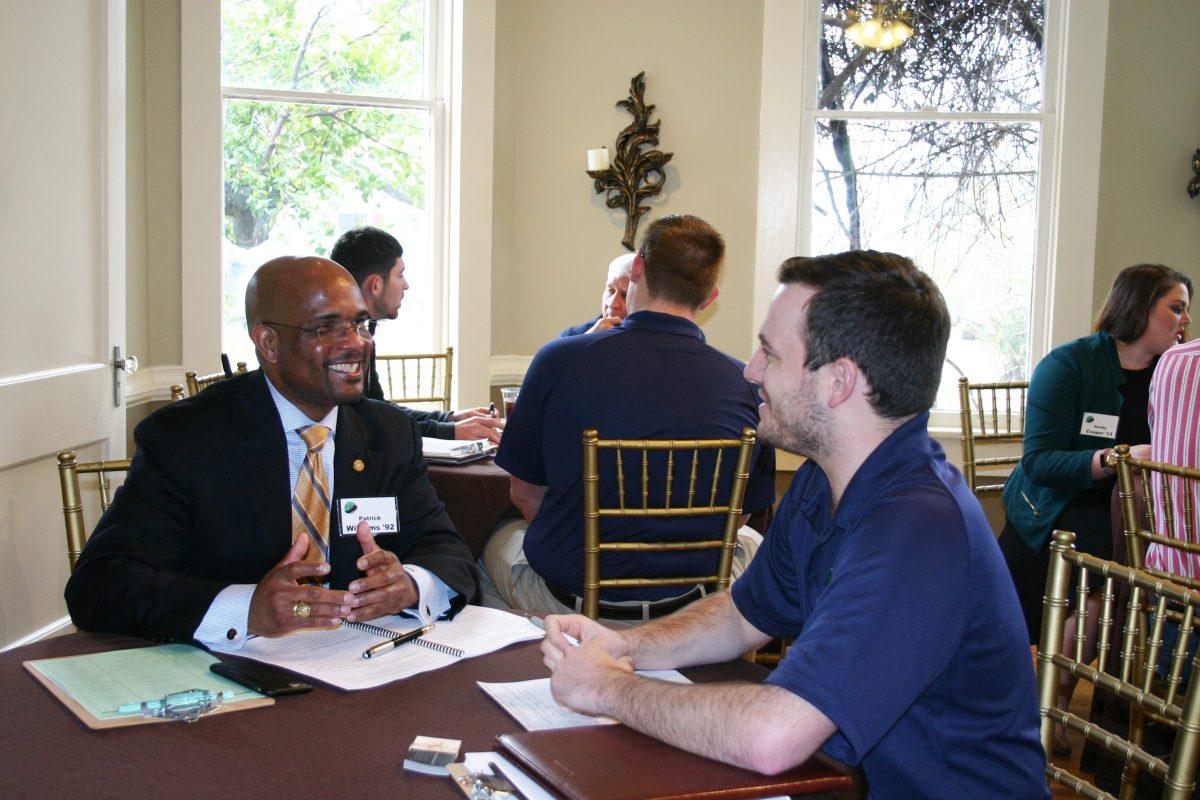Students considering careers in entrepreneurship had an chance to connect with a network of mentors, using practical advice and experience to build a foundation for future success.
In the past two Fridays at the Kyle House in Bryan, over 40 former students and business mentors spoke with students on the projects they have been working on as part of Texas A&M’s agribusiness entrepreneurship program.
In a speed dating style of interactions, mentors gave real-world advice and drew on their own successes to prepare students for their future endeavors.
“We have a series of classes revolving around agribusiness entrepreneurship that focus on both rural businesses in the ranching community in small towns while also bigger businesses in the metropolitan area as well,” said Ed Rister, professor and associate department head of agricultural economics.
Rister said students are afforded a high degree of freedom to research and plan business ventures they have a particular interest in.
“As we develop these courses, we developed the idea of the visions of letting a student pursue evaluations of a business of their own interest, so rather than having a cookie-cutter and we say here’s a case business and following each business through, a student creates their own business instead,” Rister said.
Students develop these business projects throughout the semester as they take the class, and former students come back to help take part in the forum and pass down their knowledge and success to other students. The forum held annually at the Kyle House in February is all about mid-term adjustments.
“I have been involved in this event for about 10 years,” said Joe Swinbank, one of over 40 mentors at the forum on Feb. 23. “I usually come down to three events annually, and I also lecture the class in the first semester.”
Swinbank, a mentor and a entrepreneur, graduated from A&M alongside Rister in 1974. While pursuing his undergraduate degree at A&M, he served as the president of the Petroleum Express Company. He now works with start up projects, along with Sprint Waste Services, which he co-founded in 2006.
“It’s a way to help the students in Dr. Rister’s class make adjustments to their business plans, and us as mentors are here to pass down the knowledge and life experiences,” Swinbank said. “This class is the perfect ending for a student, where all the different classes you take are used and woven together in this business plan start up, to learn the business model we’re trying to implement.”
The course was first offered at A&M in 1987 titled as farm and ranch management and then morphed into agribusiness entrepreneurship, where students plan or evaluate a specific business venture.
“It’s all about asking questions, figuring out ways to grow stronger in knowledge, network and also figuring out different ideas for my business, new marketing strategies, different ways I can grow my business, and looking for that foot in the door for a job when I finish college,” said Claire Wilson, one of the students participating in the forum.
Wilson is an agricultural communications and journalism major pursuing the agribusiness entrepreneurship minor.
“Since taking these classes, it’s really opened my eyes,” Wilson said. “Especially with going into something I may not how to do, but what I do know is what not to do. And that’s something that’ll stick with me.”
At the symposium for the program in the first week of May, students will present their finished business plans. Merritt Weeks, assistant director of the agribusiness entrepreneurship program said the mentorship forums provide an opportunity for students build the kind of network that is critical for future success.
“It’s all about the students and the mentors that come together to network,” Weeks said.
Building a better business
February 25, 2018
Photo by Courtesy
Patrick Williams, Class of 1992, and agricultural economics senior Cameron Rockett at Friday’s agribusiness entrepreneurship mentoring forum.
0
Donate to The Battalion
$2165
$5000
Contributed
Our Goal
Your donation will support the student journalists of Texas A&M University - College Station. Your contribution will allow us to purchase equipment and cover our annual website hosting costs, in addition to paying freelance staffers for their work, travel costs for coverage and more!
More to Discover










